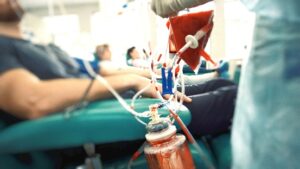In order to tease apart whether fear and anxiety in first-time blood donors actually led to fewer return donations, researchers followed 1479 first-time blood donors (67.9% female; mean age, 19.3 years) longitudinally over 14 months. First-time donors were invited to complete a survey one week following their first blood donation and again six weeks later. The survey measured anxiety, fear, self-efficacy (confidence in one’s self to donate blood), attitude about blood donation, and intention to donate again. Not surprisingly, fear and anxiety were associated with both fewer intentions to donate again and fewer blood donation attempts; 34% of the most anxious donors returned to donate again compared to 57% of the least anxious donors. Findings from this study suggest that blood centers should address specific fears (e.g., needles, pain, fainting) as well as generic fears, possibly with a question during the health screening pre-donation. Other recent studies suggest that very brief interventions can calm donor’s fear and enhance donor’s experience.
References:
- France CR, France JL, Himawan LK, Duffy L, et al. Fear is associated with attrition of first-time whole blood donors: A longitudinal examination of donor confidence and attitude as potential mediators. Transfusion 2021
- France CR, France JL, Kowalsky JM, Conatser R, et al. A randomized controlled trial of a tablet-based intervention to address predonation fears among high school donors. Transfusion 2020; 60: 1450-3.
- Gilchrist PT, Thijsen A, Masser BM, France CR, Davison TE. Improving the donation experience and reducing venipuncture pain by addressing fears among whole-blood and plasma donors. Transfusion 2021; 61: 2107-15

